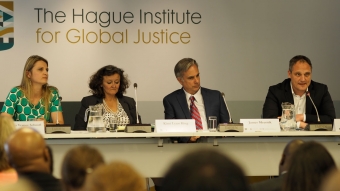The Tribunal’s Victims and Witness Section (VWS) yesterday launched at The Hague Institute for Global Justice its report “Echoes of Testimonies: A Pilot Study into the long-term impact of bearing witness before the ICTY”.
Opening remarks were delivered by ICTY President Judge Carmel Agius followed by a presentation outlining the results of the study conducted over the past four years.
Conducted in cooperation with the Castleberry Peace Institute of the University of North Texas (UNT), the VWS study examines the impact that testifying has had on 300 fact witnesses before the Tribunal. Participants hail from across Bosnia and Herzegovina, Croatia, Kosovo, and Serbia. Most of them experienced severe emotional or physical trauma during the war.
The report highlights that the process of testifying is varied, complex, and different for each witness. The most frequently cited reasons for testifying are altruistic, namely to help the judges reach an accurate decision and to fulfil a moral duty to victims. Most participants reported that testifying before the Tribunal did not worsen their health and have also indicated more positive than negative affect both before and after testifying.
The vast majority of the 300 witnesses interviewed stated that they feel relatively secure today, both those who testified publicly and those who testified with in-court protective measures. They personally felt fairly treated by the ICTY (regardless if called to testify for the Prosecution or the Defence), and they felt they contributed personally to justice and truth telling. These witnesses were optimistic about their overall life situation, but dissatisfied with the current local political situation where they reside.
Based on the study’s findings, VWS and UNT recommend that international judicial institutions further develop and standardize support mechanisms to safeguard witnesses’ well-being. VWS and UNT researchers thus call on courts to implement follow-up programs for those that testify and to develop strong relationships with the communities where witnesses live.
The report will be presented later this month in Sarajevo, Belgrade, Pristina and Zagreb.


